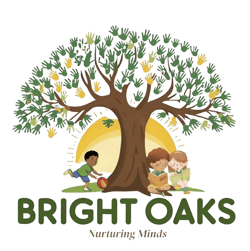Nurturing Young Minds: How Play Shapes Early Childhood Development
At BrightOaks Preschool, play isn’t just fun—it’s how we grow! From creative crafts to outdoor adventures, discover how play-based learning boosts your child’s brain, emotions, and social skills. Plus, get easy tips to encourage meaningful play at home.
5/8/20242 min read


Nurturing Young Minds: How Play Shapes Early Childhood Development
In a world that's increasingly focused on structured learning and early academic success, it's easy to overlook one of the most powerful tools in a child's development — play. At BrightOaks Preschool, we believe that play is not just a way to pass time — it's the foundation of learning, creativity, and growth.
The Science Behind Play
Research in early childhood development consistently shows that play is essential for a child's brain development. When children engage in play, especially open-ended and imaginative play, they are actively building neural connections. This helps them learn problem-solving, language skills, self-regulation, and empathy — all without a textbook in sight.
Cognitive Development Through Play
Whether it's stacking blocks, completing a puzzle, or engaging in pretend kitchen time, children learn to think critically and solve problems through play. These activities help develop memory, attention span, reasoning skills, and the ability to plan ahead — the very foundations of academic success later in life.
Emotional Growth
Play allows children to express their emotions freely and safely. When a child reenacts a real-life situation with dolls or action figures, they are processing their emotions and learning how to manage them. It’s their way of understanding the world and their place in it. Through play, children also learn how to cope with frustrations, celebrate achievements, and build confidence.
Social Skills and Communication
Group play offers valuable lessons in cooperation, negotiation, and listening. When children play together, they learn to share, take turns, resolve conflicts, and work as a team. These are vital life skills that set the stage for strong relationships and effective communication as they grow.
Physical Development
Play is also crucial for developing gross and fine motor skills. Running, climbing, hopping, and balancing all contribute to stronger muscles and better coordination. On the other hand, activities like drawing, cutting with scissors, or building with small blocks help strengthen hand-eye coordination and finger dexterity.
The Role of Teachers and Parents
Adults play an important role in guiding and enriching play experiences. At BrightOaks Preschool, our teachers create safe and stimulating environments where children are encouraged to explore and express themselves. Through a careful balance of guided activities and free play, we support each child's unique developmental journey.
Parents can do the same at home — by offering open-ended toys, engaging in storytelling, and encouraging outdoor adventures. Most importantly, giving children the freedom and time to play — without screens or rigid schedules — is one of the greatest gifts we can offer.
Conclusion: Play is Learning
Play isn’t a break from learning — it is learning. Every laugh, every block tower, every pretend tea party is a step toward becoming a more curious, capable, and confident individual. At BrightOaks Preschool, we nurture young minds not by rushing them through academics, but by giving them the space to grow through joyful exploration.
Let’s celebrate the power of play — because it’s how little minds grow big ideas.
Connect with us
Nurturing young minds through playful education.
CONTACT
© 2025. All rights reserved.
Neeladri Road - Bettadasanapura
Sy No 62/3, Hongirana farm house,Near Vinayaka layout, Bye pass road, beside temple tree leisure, Bettadasanapura, Neeladri Road, Begur post, Bengaluru
(Bangalore ) - 560 068. Karnataka.
